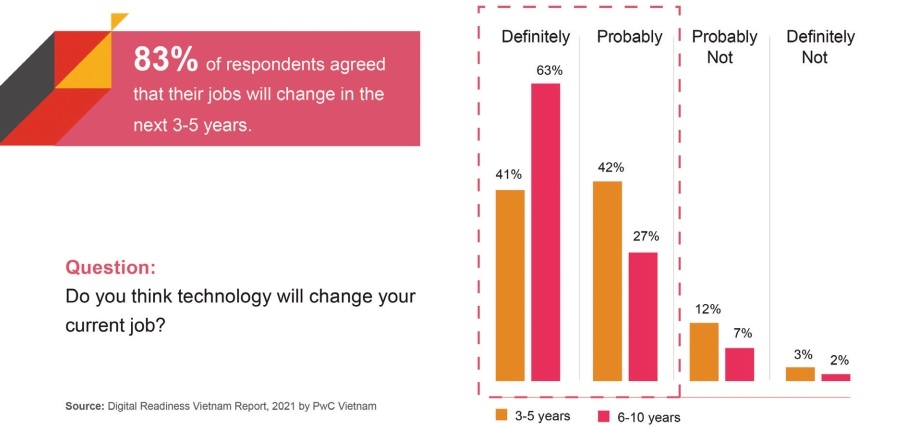High optimism on the future of work
 |
| High optimism on the future of work |
With a survey sent out to the Vietnamese public from November 12 to December 27 last year, 1146 responses were collected from a list of questions relating to technology, jobs, and skills. PwC Vietnam chairman Grant Dennis said, “Our survey findings reflect the accelerated presence and influence of technology in the workplace and the pace of change to come in Vietnam. Enabling workers and firms to adapt in the new technological environment and empowering them to achieve outcomes will be key to any organisation’s success.”
According to the survey, the findings highlight that changes are underway, and fast. There is general agreement that technology is changing jobs – 90 per cent believe that technology will change their current jobs in the medium term (6-10 years), and 83 per cent believe they will feel the impact in the short term (3-5 years).
The perception of such changes is also layered with optimism, where 90 per cent of Vietnamese respondents believe that technological developments will improve their job prospects in the future. This level is much higher than the global sentiment of 60 per cent recorded in PwC’s Global Upskilling Hopes and Fears report released in 2019. However, there are lingering concerns about automation putting jobs at risk.
In response to the rise of digital transformation, a majority of respondents (84 per cent) say that they would learn new skills now or completely retrain in order to improve future employability. To address the widening skills gap, there is need for collaborations among governments, institutions, and businesses.
The significant impact of technology on jobs, however, comes with a sense of uncertainty. The report noted that 45 per cent of Vietnamese respondents expressed concerns around job security due to automation. This is not surprising as the uses of digital technologies are increasingly becoming key solutions across industries. This progress is shaping a future where digital skills are expected to be among the top 10 job competencies in the next five years.
The need for adapting new skills resonates with the majority of the survey respondents. The report reveals a majority (93 per cent) are already making efforts to reskill and upskill. Technology related skills are top of mind, with 43 per cent respondents wanting to become better at learning and adapting to different technologies and 34 per cent looking to become proficient in a specific technology.
It is encouraging to note that 88 per cent Vietnamese surveyed said that to different extents, they are provided opportunities to improve their digital skills at work. This shows that businesses are doing their part to meet the upskilling needs of their workforce.
However, the skill mismatch and opportunity gaps are real and widening in an increasingly technology-enabled economy - globally and locally.
According to PwC’s Global CEO survey 2021, 79 per cent of CEOs in Asia-Pacific expressed concern about availability of key skills, compared to 72 per cent globally.
In this regard, while over half of respondents feel the responsibility for upskilling is on them, PwC believes both the government and businesses have important roles in providing people access to inclusive upskilling programmes.
“COVID-19 has intensified the stark mismatch of people with the right skills for available jobs, making the need to upskill and reskill people increasingly critical. Government, business leaders, and educational institutions must work together to upskill our people to meet the workforce needs of the future and drive inclusive, sustainable, social, and economic growth for Vietnam,” added Dinh Thi Quynh Van, general director of PwC Vietnam.
What the stars mean:
★ Poor ★ ★ Promising ★★★ Good ★★★★ Very good ★★★★★ Exceptional
Themes: Digital Transformation
- Dassault Systèmes and Nvidia to build platform powering virtual twins
- Sci-tech sector sees January revenue growth of 23 per cent
- Advanced semiconductor testing and packaging plant to become operational in 2027
- BIM and ISO 19650 seen as key to improving project efficiency
- Viettel starts construction of semiconductor chip production plant
Related Contents
Latest News
More News
- IP alterations shape asset strategies for local investors (January 22, 2026 | 10:00)
- 14th National Party Congress: Vietnam - positive factor for peace, sustainable development (January 22, 2026 | 09:46)
- Japanese legislator confident in CPV's role in advancing Vietnam’s growth (January 22, 2026 | 09:30)
- 14th National Party Congress: France-based scholar singles out institutional reform as key breakthrough (January 21, 2026 | 09:59)
- 14th National Party Congress: Promoting OV's role in driving sustainable development (January 20, 2026 | 09:31)
- 14th National Party Congress affirms Party’s leadership role, Vietnam’s right to self-determined development (January 20, 2026 | 09:27)
- Direction ahead for low-carbon development finance in Vietnam (January 14, 2026 | 09:58)
- Vietnam opens arms wide to talent with high-tech nous (December 23, 2025 | 09:00)
- Why global standards matter in digital world (December 18, 2025 | 15:42)
- Opportunities reshaped by disciplined capital aspects (December 08, 2025 | 10:05)

 Tag:
Tag:




















 Mobile Version
Mobile Version